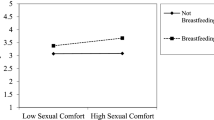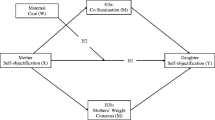Abstract
The sexualization of the breast may lead women who internalize the sexual objectification of their bodies to have more negative attitudes toward breastfeeding. The purpose of the present study was to examine self-objectification in relation to young women’s attitudes toward and concerns about breastfeeding. Two hundred and seventy-five female undergraduates completed a survey with questions that assessed their plans for infant feeding, attitudes toward breastfeeding, concerns about breastfeeding, and self-objectification. Women who scored higher on measures of self-objectification were more likely to view public breastfeeding as indecent and to be concerned that breastfeeding would be embarrassing and would negatively impact their bodies and sexuality. Self-objectification was not related to general attitudes toward breastfeeding or to young women’s future infant feeding plans. Implications for theory and future research are discussed.
Similar content being viewed by others
References
American Academy of Pediatrics (2005). Breastfeeding and the use of human milk. Pediatrics, 115, 496–506.
American Dietetic Association (2001). Position of the American Dietetic Association: Breaking the barriers to breastfeeding. Journal of the American Dietetic Association, 101, 1213–1220.
Barnes, J., Stein, A., Smith, T., & Pollock, J. I. (1997). Extreme attitudes to body shape, social and psychological factors, and a reluctance to breast feed. Journal of the Royal Society of Medicine, 90, 551–559.
Bartlett, A. (2003). Breastfeeding bodies and choice in late capitalism. Hectate, 29, 153–165.
Bartlett, A. (2005). Maternal sexuality and breastfeeding. Sex Education, 5, 67–77.
Blum, L. M. (1993). Mothers, babies, and breastfeeding in late capitalist America: The shifting contexts of feminist theory. Feminist Studies, 19, 291–311.
Bramwell, R. (2001). Blood and milk: Constructions of female bodily fluids in Western society. Women & Health, 34(4), 85–96.
Callen, J., & Pinelli, J. (2004). Incidence and duration of breastfeeding for term infants in Canada, United States, Europe, and Australia: A literature review. Birth, 31, 285–292.
Calogero, R. M. (2004). A test of objectification theory: The effect of the male gaze on appearance concerns in college women. Psychology of Women Quarterly, 28, 16–21.
Carter, P. (1996). Breastfeeding and the social construction of heterosexuality or ‘what breasts are really for.’ In J. Holland & L. Adkins (Eds.), Sex, sensibility, and the gendered body. (pp. 99–119). New York: Saint Martin’s Press.
Center for Disease Control (2005). National Immunization Survey. Retrieved August 2, 2006 from www.cdc.gov/breastfeeding/data/NIS_data/data_2005.htm.
De La Mora, A., Russell, D. W., Dungy, C. I., Losch, M., & Dusdieker, L. (1999). The Iowa Infant Feeding Attitude Scale: Analysis of reliability and validity. Journal of Applied Social Psychology, 29, 2362–2380.
Dermer, A. (1998). Breastfeeding and women’s health. Journal of Women’s Health, 7, 427–433.
Dettwyler, K. A. (1995). Beauty and the breast: The cultural context of breastfeeding in the United States. In P. Stuart-Macadam & K. A. Dettwyler (Eds.), Breastfeeding: Biocultural perspectives (pp. 167–215). New York: de Gruyter.
Dworkin, S. L., & Wachs, F. L. (2004). “Getting your body back”: Postindustrial fit motherhood in Shape Fit Pregnancy magazine. Gender & Society, 18, 610–624.
Earle, S. (2002). Factors affecting the initiation of breastfeeding: Implications for breastfeeding promotion. Health Promotion International, 17, 205–214.
Forbes, G. B., Adams-Curtis, L. E., Hamm, N. R., & White, K. (2003). Perceptions of the woman who breastfeeds: The role of erotophobia, sexism, and attitudinal variables. Sex Roles, 49, 379–388.
Fredrickson, B. L., & Roberts, T-A. (1997). Objectification theory: Toward understanding women’s lived experiences and mental health risks. Psychology of Women Quarterly, 21, 173–206.
Fredrickson, B. L., Roberts, T-A., Noll, S. M., Quinn, D. M., & Twenge, J. M. (1998). That swimsuit becomes you: Sex differences in self-objectification restrained eating, and math performance. Journal of Personality and Social Psychology, 75, 269–284.
Galtry, J. (1997). Suckling and silence in the USA: The costs and benefits of breastfeeding. Feminist Economics, 3, 1–24.
Geck, L. (2001). College students’ attitudes, knowledge, and prior exposure to breastfeeding. In I. Johnston-Robledo & J. C. Chrisler (Eds.), [A menstrual cycle, a life cycle: Women’s reproductive health across the lifespan. Proceedings of the Fourteenth Conference of the Society for Menstrual Cycle Research] (pp. 381–401).
Hannon, P. R., Willis, S. K., Bishop-Townsend, V., Martinez, I., & Scrimshaw, S. C. (2000). African-American and Latina adolescent mothers’ infant feeding decisions and breastfeeding practices: A qualitative study. Journal of Adolescent Health, 26, 399–407.
Hausman, B. L. (2003). Mother’s milk: Breastfeeding controversies in American culture. New York: Routledge.
Johnston-Robledo, I., Ball, M., Lauta, K., & Zekoll, A. (2003). To bleed or not to bleed?: Young women’s attitudes toward menstrual suppression. Women & Health, 38, 59–75.
Johnston-Robledo, I., & Fred, V. M. (in press) Self-objectification and lower income pregnant women’s breastfeeding attitudes. Journal of Applied Social Psychology.
Johnston-Robledo, I., Sheffield, K., Voigt, J., & Wilcox-Constantine (2006). Reproductive shame: Self-objectification and young women’s attitudes toward their reproductive functioning. (in press).
Kloeblen-Tarver, A. S., Thompson, N. J., & Miner, K. R. (2002). Intent to breastfeed: The impact of attitudes, norms, parity, and experience. American Journal of Health Behavior, 26, 182–187.
Law, J. (2000). The politics of breastfeeding: Assessing risk, dividing labor. Signs, 25, 4–450.
Li, R., Hsia, J., Fridinger, F., Hussain, A., Benton-Davis, S., & Grummer-Strawn, L. (2004). Public beliefs about breastfeeding policies in various settings. Journal of the American Dietetic Association, 104, 1162–1168.
McIntyre, E., Hiller, J. E., & Turnbull, D. (2001). Community attitudes to infant feeding. Breastfeeding Review, 9(3), 27–33.
McKinley, N. M., & Hyde, J. S. (1996). The Objectified Body Consciousness Scale: Development and validation. Psychology of Women Quarterly, 20, 181–215.
McKinley, N. M., & Hyde, J. S. (2004). Personal attitudes or structural factors?: A contextual analysis of breastfeeding duration. Psychology of Women Quarterly, 28, 388–399.
Moradi, B., Dirks, D., & Matteson, A. V. (2005). Roles of sexual objectification experiences and internalization of standards of beauty in eating disorder symptomatology: A test and extension of objectification theory. Journal of Counseling Psychology, 52(3), 420–428.
Morse, J. M. (1989). “Euch, those are for your husband!” Examination of cultural values and assumptions associated with breast-feeding. Health Care for Women International, 11, 223–232.
Muehlenkamp, J. L., & Saris-Baglama, R. N. (2002). Self-objectification and its psychological outcomes for college women. Psychology of Women Quarterly, 26, 371–379.
Muehlenhamp, J. L., Swanson, J. D., & Brausch, A. M. (2005). Self-objectification, risk taking, and self-harm in college women. Psychology of Women Quarterly, 29, 24–32.
National Center for Health Statistics (2001). Healthy People 2000 final review. Hyattsville, MD: Public Health Service. Retrieved October 5, 2005 from http://www.cdc.gov/nchs/about/otheract/hp2000/hp2k.htm.
National Conference of State Legislatures (2005, May). 50 state summary of breastfeeding laws. Retrieved September 29, 2005 from http://www.ncsl.org.
Noll, S. M., & Fredrickson, B. L. (1998). A mediational model linking self-objectification, body shame, and disordered eating. Psychology of Women Quarterly, 22, 623–636.
O’Keefe, T. D., Henly, S. J., & Anderson, C. M. (1998). Breast feeding on campus: Personal experiences, beliefs, and attitudes of the university community. Journal of American College Health, 47, 129–134.
Petersen, M. (2004, December 4). Breastfeeding ads delayed by a dispute over content. New York Times. Retrieved August 3, 2006 from http://www.momobile.org/breastfeeding/news_nyt_12_04_03.html.
Roberts, T. A. (2004). Female trouble: The Menstrual Self-evaluation Scale and women’s self-objectification. Psychology of Women Quarterly, 28, 22–26.
Roberts, T. A., & Waters, P. L. (2004). Self-objectification and that “not so fresh feeling”: Feminist therapeutic interventions for healthy female embodiment. In J. C. Chrisler (Ed.), From menarche to menopause: The female body in feminist therapy. (pp. 5–21). New York: Haworth.
Rodriguez-Garcia, R., & Frazier, L. (1995). Cultural paradoxes relating to sexuality and breastfeeding. Journal of Human Lactation, 11, 111–116.
Rozin, P., & Fallon, A. (1980). The psychological categorization of foods and non-foods: A preliminary taxonomy of food rejections. Appetite, 1, 193–201.
Ryan, A. S., Wenjun, Z., & Acosta, A. (2002). Breastfeeding continues to increase into the new millennium. Pediatrics, 110, 1103–1109.
Saha, P. (2002). Breastfeeding and sexuality: Professional advice literature from the 1970s to the present. Health Education & Behavior, 29, 61–72.
Stearns, C. A. (1999). Breastfeeding and the good maternal body. Gender & Society, 13, 308–325.
U. S. Department of Health & Human Services. (2001). Health people 2010, volume 2. Retrieved from http://www.healthypeople.gov.
Ussher, J. (1989). The psychology of the female body. New York: Routledge.
Wallach, H. R., & Matlin, M. W. (1992). College women’s expectations about pregnancy, childbirth, and infant care: A prospective study. Birth, 19, 202–207
www.007b.com/breastfeeding_public.php Retrieved on August 1, 2006.
Yalom, M. (1997). A history of the breast. New York: Ballantine.
Young, I. M. (2003). Breasted experience: The look and the feeling. In R Weitz (Ed.), The politics of women’s bodies (pp. 152–163). New York: Oxford University Press.
Author information
Authors and Affiliations
Corresponding author
Rights and permissions
About this article
Cite this article
Johnston-Robledo, I., Wares, S., Fricker, J. et al. Indecent Exposure: Self-objectification and Young Women’s Attitudes Toward Breastfeeding. Sex Roles 56, 429–437 (2007). https://doi.org/10.1007/s11199-007-9194-4
Published:
Issue Date:
DOI: https://doi.org/10.1007/s11199-007-9194-4




